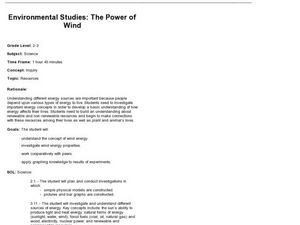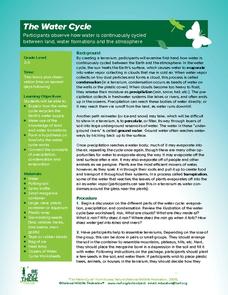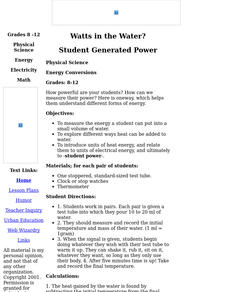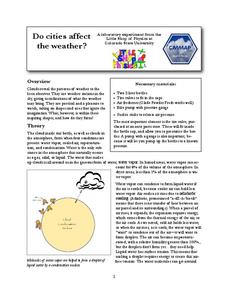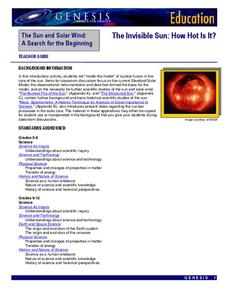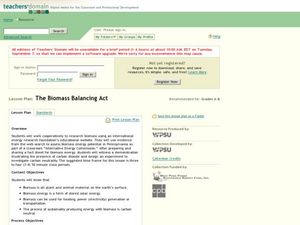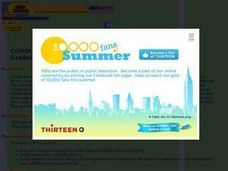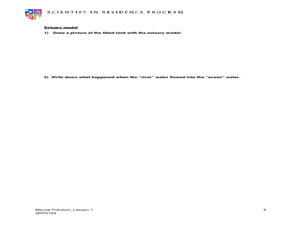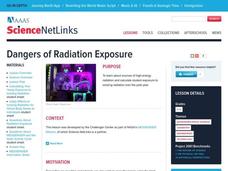Curated OER
The Energy Debate - Sea Level Rise
Students comprehend the impact of global warming on our coastal cities. They appreciate how geographic information systems can be used to represent scientific data. Students research the melting of the ice caps in Antarctica and the Arctic.
Curated OER
Chemistry Foundations
Extensive notes on foundational chemistry concepts make up this resource. It summarizes the properties of matter, the periodic table, chemical nomenclature, and general chemical bonding. Design a set reading comprehension questions to go...
American Chemical Society
Changing State: Melting
Dry ice is extremely cold — it is -109.3°F or -78.5°C. Scholars observe and explain the molecular motion associated with melting. Then they design their own experiments to speed up the melting process. Finally, a teacher presents a...
Curated OER
Environmental Studies: The Power of Wind
Investigate the prospect of wind as a renewable resource. Second and third graders make a pinwheel, answer critical thinking questions, and then attempt to use wind power to wind string. I would be more apt to use this lesson in a 1st or...
Carnegie Mellon University
Bathtub Model
Using a colorful infographic handout and a guide sheet, hold a class discussion about how a bathtub can serve as a model for the greenhouse effect created by Earth's atmosphere. Participants will understand that as energy or matter is...
Curated OER
Thermochemistry
For this thermochemistry worksheet, students calculate the enthalpy of vaporization as well as the write the thermochemical expression for the production of the chemical reaction.
Curated OER
The Water Cycle
Students are introduced to the components and importance of the water cycle. They are shown how groundwater moves using a model. Students list 9 places on earth where water is found. They define the terms cycle and water cycle.
Curated OER
Thermal Pollution
In this pollution worksheet, students read about thermal pollution and how hot water affects wildlife. Then students complete 1 short answer question.
Curated OER
Kingdom Fungi
In this kingdom fungi instructional activity, students conduct an experiment creating and observing dough. They describe what happened to the dough while they observed it and name the type of fungus is the yeast added. Students also...
Colorado State University
Do Cities Affect the Weather? (Making a Cloud in a Bottle)
The dynamics of a city can have a drastic effect on the weather. A hands-on lesson asks learners to build a model to illustrate how city pollution provides a nucleus for condensation. The greater the pollution, the greater chance for...
Cornell University
Atomic Bonding
Explore the connection of surface area to bonding within atoms. Learners complete lab investigations to model changing surface area with different sizes and concentrations of atoms. A flour fireball demonstration follows the labs to...
NASA
The Invisible Sun: How Hot Is It?
It's getting hot in here! The first in a series of six lessons has learners model nuclear fusion with a simple lab investigation. Groups collect data and analyze results, comparing their models to the actual process along the way.
Curated OER
The Biomass Balancing Act
Students work in groups to research biomass using the International Energy Agency's website. Students use evidence from the web search to assess biomass energy potential in Pennsylvania as part of a classroom "Alternative Energy...
Curated OER
Precipitates and Black Smokers
Students discuss how hydrothermal fluid is different from seawater and what happens to it as it passes through the oceanic crust. They observe and manipulate calcuim chloride and baking soda to comprehend how precipates form.
Curated OER
Impact Craters: Holes in the Ground!
Students simulate crater formation through a lab activity. In this space science lesson, students calculate how much energy is transferred during meteorite impact. They identify different factors affecting the size and depth of craters...
Curated OER
Biotic and Abiotic Factors
In this biotic and abiotic factors worksheet, students complete 20 various types of questions related to biotic and abiotic factors. First, they write the vocabulary word that best completes the sentence. Then, students state an example...
Curated OER
Conduction, Convection, Radiation, Oh My!
Learners draw a line graph, and use graphing as a tool to discover more about conduction, convection and radiation. They should design their own experiment using heat sensitive paper to show they explain these 3 processes.
Curated OER
Modeling Estuaries
Students create a model estuary. In this modeling estuaries lesson, students identify characteristics and mix water of varying densities. Students form a hypothesis, conduct an experiment, and analyze the results.
Curated OER
Dangers of Radiation Exposure
High schoolers calculate their yearly exposure rate to harmful high-energy radiation and cumulative effects over time. They use the information to evaluate the various sources of radiation that are of greatest concern for them.
Curated OER
Infrared-Hot
Students describe how the sun heats the Earth, explain the nature of infrared light, explain how thunderstorms are formed and use infrared maps to predict severe weather.
Curated OER
Chemistry Worksheet-Phase Changes
In this phase change worksheet, students answer twenty questions about changes in energy to a system. They analyze phase diagrams, the determine the effects of changes in temperature on a system, they answer questions about miscibility,...
Curated OER
The Wind & Sun: Powerful Alternatives
Students examine the power that is possible from the sun through an interactive program. They also analyze how energy turns into different forms in different parts of the human body. They finally explore how wind is created and how wind...
Curated OER
Calorie Connection
Students calculate the calories in a Brazil nut and the calories needed for daily intake. In this calories lesson plan, students use calorimetry to measure the change in water temperature heated by the burning of a Brazil nut. They also...





